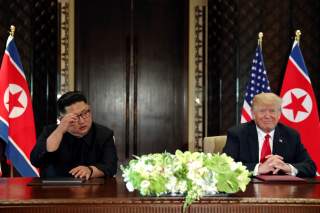North Korea Denuclearization Is Nice, but Peace Is Better
Washington must realize the power of deterrence and peace rests in its hands, not Pyongyang's.
North Korea celebrated the seventieth anniversary of their founding on Sunday, with a massive military parade featuring tanks, artillery, and goose-stepping combat troops. It was what the parade didn’t include, however, that made global headlines—no intercontinental ballistic missiles (ICBMs). While not an “irreversible” step towards denuclearization, it does contribute to the potential for peace on the Korean peninsula.
Before either the April summit between South Korean president Moon Jae-in and North Korean dictator Kim Jong-un or the June summit between President Trump and Kim, a military parade in early February featured their two most potent ICBMs, the Hwasong 14 and 15. Sunday’s parade included neither.
Just as significant, in preparation for the third Moon-Kim summit in September, South Korean officials who met with Kim last week and said the North Korean leader “reaffirmed his determination to completely denuclearize.”
It is still far too early in the negotiation process to say whether or not Kim genuinely intends to denuclearize completely—I am skeptical—but substantive actions and symbolic gestures continue to move in a direction that makes peace possible. However, it’s crucial to note that American security and continued economic prosperity are not dependent on Kim making good on his promises. That power continues to reside in Washington.
The key to wielding that power effectively requires the administration to recognize two essential truths. First and foremost, is that while multiple paths could lead to peace on the peninsula, there is only one way to lose: if America were to ever engage in the unprovoked use of force.
Doing so would almost certainly spark a war in which U.S. interests would suffer substantial losses, wholly irrespective of how the war ended. Despite what some suggest, a sober analysis of the military and political factors involved reveals that Kim can be effectively deterred—indefinitely—by America’s overwhelmingly superior nuclear arsenal and conventional capability.
Senior Chinese Communist Party official Li Zhanshu represented China at Sunday’s parade. Reuters reported that Li and Kim met together and noted, “North Korea was focusing on economic development and hopes to learn from China’s experience in this regard.” Evidence suggests Kim is not focused on creating a powerful offensive military to conquer other states, but to have an effective deterrent to allow his regime to survive while he strengthens his domestic economy.
The North Korean dictator again emphasized publicly that he is seeking the lowering of tensions in Korea, not military domination. Chinese state media paraphrased Kim after the parade as saying he “upholds the consensus of the Singapore meeting between the leaders of North Korea and the United States and has taken steps for it and hopes the United States takes corresponding steps, to jointly promote the political resolution process for the peninsula issue.”
Kim continues to take actions consistent with a leader that desires to remain in power by strengthening the economic basis that will ensure his regime survives well into the future. While there is no doubt Kim is a ruthless dictator that will not hesitate to kill or imprison any in his country who threaten his authority, his desire to survive and retain power means he can be deterred from ever using his weapons. After all, he rightfully recognizes the United States would obliterate him and his regime should he ever use them.
The second key is setting the right objective. Many, such as uber-hawk Sen. Lindsey Graham, argue the objective should be complete, verifiable, and irreversible denuclearization (CVID). This should be a long-term goal of the administration, but it is not a must-have outcome.
Trump’s non-negotiable requirements should be the preservation of American security, the protection of U.S. economic interests in Asia, and the pursuit of peace on the peninsula.
Making CVID a must-have would set America up for near-certain failure. If full denuclearization is eventually possible, it is a virtual certainty it would not come for many years. Kim may be brutal, but he is also pragmatic. It is unlikely he would completely dismantle his entire nuclear program before he receives iron-clad security guarantees that the United States will not pursue regime change, which will only come with diplomacy.
It will take many years of trust-building to convince the North Koreans that Washington is committed to peaceful coexistence. That means the U.S. military will not use any military force to denuclearize North Korea or remove Kim from power.
Many in the administration and Congress desire near-term resolutions. National Security Advisor John Bolton said he preferred a one-year timeframe. If America expects a CVID outcome in the near term and doesn’t get it, some will argue for a return to military threats or ultimatums—to which Kim is not likely to submit. That is the path to war, to the deaths of potentially millions of American allies and U.S. citizens, and significant harm to U.S. national interests.
What is realistic is a phased approach in which America exchanges actions for actions. North Korea has taken real steps toward peace—the United States should reciprocate. This will build trust between both nations over time and may lead to additional and increasingly substantive steps by Pyongyang, which could make peace on the peninsula a reality and denuclearization more likely (though certainly not guaranteed).
What’s paramount in the short-and long-run is U.S. security and prosperity, which the president can always guarantee with deterrence and diplomacy.
Daniel L. Davis is a senior fellow for Defense Priorities and a former lieutenant colonel in the U.S. Army who retired in 2015 after twenty-one years, including four combat deployments. Follow him @DanielLDavis1.
Image: U.S. President Donald Trump and North Korea's leader Kim Jong Un hold a signing ceremony at the conclusion of their summit at the Capella Hotel on the resort island of Sentosa, Singapore June 12, 2018. Picture taken June 12, 2018. REUTERS/Jonathan Ernst

